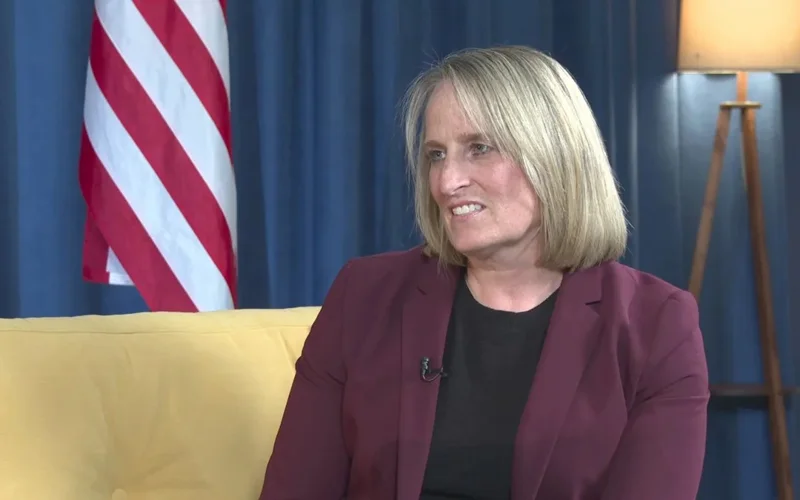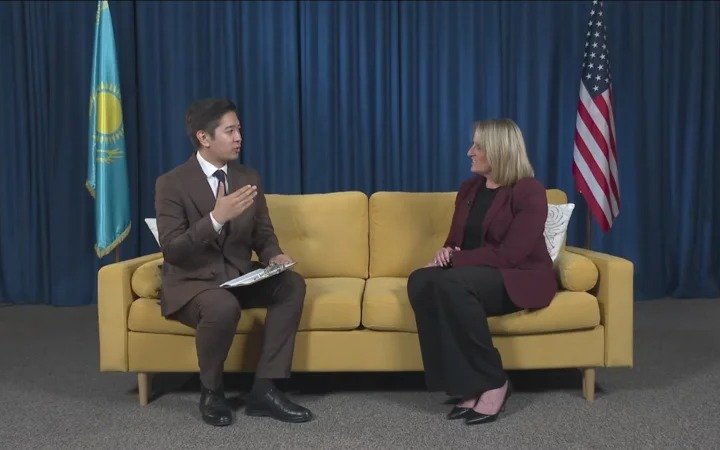We won’t ask Kazakhstan to choose sides - U.S. Diplomat on sovereignty, trade and Central Asia
In an exclusive interview with Silk Way TV Channel, Chargé d’Affaires of the U.S. Mission in Kazakhstan Deborah Robinson spoke about the key priorities of American diplomacy in the region, emphasizing strong bilateral ties, trade cooperation, and support for Kazakhstan’s sovereignty. She explained that the U.S. is not seeking to compete with other global powers in Central Asia, but rather to foster mutually beneficial partnerships based on shared interests and values, Kazinform News Agency correspondent reports.

- What was the most unexpected experience you had here in Kazakhstan?
- That's an interesting question. And I would say it's one of the most recent discoveries that I’ve made about Kazakhstan is that tulips are native to Kazakhstan. I didn't know this and so a couple weeks ago I made a trip down to southern Kazakhstan actually and it was unexpected to stand in a field of wild tulips, a red tulip as far as I could see. It was pretty amazing so I really enjoyed that opportunity.
- What is your personal diplomatic mission right now here in Kazakhstan?
- Well, so I'm happy to be in Kazakhstan. I've worked in and on the region for a long time now. I worked – I was the first ever actually C5+1, the United States - Central Asia Diplomatic Platform Coordinator for the United States, 10 years ago and since then I've had positions in Uzbekistan and Afghanistan and Pakistan and India and I've worked as a Foreign Policy Advisor, actually, to a military general where we traveled to the region quite a bit as well so I know the region well and I think these skills and the knowledge have allowed me to be better able to navigate the complexities of the region. But as for my personal mission here I would say the United States has a strong history of building people-to-people ties, security ties, commercial ties, and I want to do the best I can to help strengthen that legacy here in Kazakhstan.
- Let us discuss politics. Let us start with the U.S. foreign policy. So, may I ask you this question: How should countries like Kazakhstan interpret Washington's proposed cuts to the State Department’s budgets, to fewer embassies, to less fundings on these organizations like UN or NATO?
- Well, it's a very timely question, obviously, with everything that's going on right now. But I would say what I would go to is that the strategic direction of U.S. foreign policy hasn't changed. It's based on the principles of strong partnerships and shared values and mutual respect, and that's going to continue to guide our decisions and our asks. And it's been a bedrock of American diplomacy for decades, and that's not going to change. You know, the strong partnerships, to make America safer and stronger, we rely on strong partnerships with reliable allies and with effective international organizations. And so, we'll continue to do that while President Trump emphasizes that we are going to prioritize our own interests at home and abroad in order to ensure that we're serving the American people. But we depend on, and we rely on our friends and our allies, and we'll continue to build and maintain relations with countries like Kazakhstan.
- So, it doesn't matter who's in charge in the White House, right?
- I would say that each president has some of its own – has some of their own priorities that they want to emphasize, but the foundations of American diplomacy are strong and will continue to be maintained from administration to administration.

- How does U.S. see its role in Central Asian region? I mean, is it about competing with China and Russia, or is it building a distinct, independent agenda?
- Having spent quite a bit of time in the region, this is something that I am often asked. And I would say it's not about competing with any other country here in Central Asia. It's about representing American interests and ensuring that we are working together to build strong partnerships in areas of mutual interest. The United States has been involved in Central Asia for quite some time, and we are committed to having a strong partnership. We believe that Central Asia should be a strong, integrated region that can work together with the United States.
As I mentioned 10 years ago, it's the 10th anniversary of the United States-Central Asia C5+1 diplomatic platform partnership, and this is a partnership that Secretary Rubio has said is a mechanism to make a more peaceful and prosperous Central Asia. So that's what we want to see. We want to work together with our Central Asia partners for that. And beyond regional integration, though, we encourage education, English learning education, tech partnerships, security partnerships, and educational exchanges, and other programs that we think work to our mutual benefit. So, we think we have a unique role to play here in Central Asia, and we want to be a strong partner for the mutual benefit of the region and the United States.
- Talking precisely about U.S.-Kazakhstan relations, how did it evolve over the past decades?
- You know, Kazakhstan has been a reliable partner and a key partner for the United States since independence over 30 years ago. And I guess to say if there's been an evolution in Washington's thinking on Kazakhstan, it is just that Kazakhstan has become a stronger partner and one in where we continue to uncover new areas of mutual interest. And I think those interests lie in many areas. I would say bilateral U.S.-Kazakhstan trade and investment, critical minerals and mining, energy, infrastructure, and other areas where we have mutual interests. And I think we'll continue to look forward, we continue to look forward to working with Kazakhstan to increase our ties and to work together in areas that make both of our countries safer, secure, safer, stronger, and more prosperous.
- We see that now it's turbulent times. We see a lot of polarization, confrontations, wars. What is the US’ message to Kazakhstan? Is it to pick a side or stay neutral?
- The United States won't ask Kazakhstan to choose sides. We welcome Kazakhstan's multi-vector foreign policy. We, the United States, we are committed to supporting Kazakhstan's sovereignty, independence, and territorial integrity. And that's a message that Secretary Rubio conveyed to Foreign Minister Nurtleu in their phone conversationhere just a couple weeks ago. And I think that's one of the things that we would say is that we encourage Kazakhstan to have diversified and balanced international relations and to have a strong relationship with the United States. And we see those two things as not mutually exclusive but mutually inclusive, actually.
- Talking about supporting sovereignty and multi-vectoral policy, how does it look in practice? I mean support from the US.
- Well, I think that we are looking for areas consistently with Kazakhstan, areas where we can work together. I mentioned some of those fields here earlier, and I think that that's what we want to do is to identify those areas where they are mutually beneficial and then create atmospheres where we can then work together to gain those opportunities and to fulfill those opportunities for both our people, our companies, our governments, kind of across all of those areas. Those are ways that we want to cooperate in order to strengthen our bilateral relationship.
- Let us move on to another topic, the topic of trade and tariffs. So, my first question would be, what is U.S. long-term strategy on tariffs? Is Washington truly ready to restructure global trade, or what is it?
- Well, I think the White House is looking to recalibrate international trade to ensure that it's fair and balanced and that it protects American interests, American people, American companies, our industrial base, and our national security. And the United States welcomes trading partners who align with our efforts to create fair and balanced trade atmospheres between countries. And the United States is doing this in order to address the imbalances and to try to make the market environment more predictable and more transparent. And that in the long term it is better for everyone. It creates an environment where investors can feel like they are safe in investing and where companies want to work. And so, I think the White House is looking holistically at trade imbalances and trying to make them more fair and even-handed.
- But how could it affect the economic ties with Kazakhstan and the investment environment here?
- Right. I would say,I think it's important to note that most of the trade between Kazakhstan and the United States is in categories that are exempt from tariffs. So that's important to know. But I think that nonetheless, we would encourage Kazakhstan to continue to take steps to create an atmosphere here to align with international best practices and trade. And in doing so, that will attract more American investors and more business. American businesses want to know that they're going into a place where their investments will be protected. And I think that that's part of what the White House is trying to do when it's addressing some of these trade imbalances, is to make sure that there's a level playing field for all companies, but obviously, from our point of view, for American companies.
- But still, we have the highest tariffs among all Central Asian countries, 27%. What is the reason behind this?
- I think that it's just a matter of what the trade is between Kazakhstan and the United States. And it's the way that the White House looked at the numbers, and they looked at the trade imbalance. And it just means that the trade imbalance was more with Kazakhstan than it was with other countries in Central Asia and the United States. And the White House is seeking to right that balance.
- You remember probably earlier this year, in February, in Congress there was a discussion about the Jackson-Vanik Amendment. Is there a hope that the issue will return to the agenda?
- Well, the first thing I would have to say is that I can't speak on behalf of Congress. Obviously, this is something that is completely within their purview. They are the only entity in the United States that can take action on repealing the Jackson-Vanik Amendment as it relates to Kazakhstan. So, I can say that from our side, from the U.S. Department of State, we want to promote open, free, and fair trade with all countries, including Kazakhstan. But for anything further on that, I would have to point you towards Congress, as they're the ones that have to take the action on this.
- We know that the U.S. is investing in critical minerals. Are American companies interested in Kazakhstan's resource potential, especially in rare earth metals?
- Definitely. This is an area where Kazakhstan, American companies are very interested and there's the critical reserves that Kazakhstan has makes it a very attractive destination for U.S. trade investments and companies and the United States actually has a long history of working with Kazakhstan in critical minerals and especially in the mining sector and we're proud of and we support U.S. companies that are working in this sector, including U.S. companies that have joint ventures with the state-owned mining company, and other companies that are working to provide support and services to other companies working in this field.
A couple weeks ago, I spoke at MINEX (Mining and Exploration Forum), the big MINEX forum that was here in Astana, and talked about ways that Kazakhstan and the United States could collaborate to make Kazakhstan more attractive for US investment and US firms here. And we at the embassy are working on that. We're trying to attract and facilitate US businesses coming to Kazakhstan. In the last two years, we've had three trade missions that have come to Kazakhstan, and we're planning two more in the next year. And we hope that critical minerals and the mining sector will be a big part of these trade missions that come to Kazakhstan, and we hope to attract additional American investment here in Kazakhstan in those fields.
- If you had an opportunity – of course, you have an opportunity – to send the one message from American people to Kazakh people, what would it be?
- Let's see. I think I would say, I would emphasize that the United States stands strongly behind Kazakhstan's sovereignty, independence, and territorial integrity, and also in our trade and economic and commercial relationship. Let's work together to make a future that's bright and prosperous for both of our countries and both of our peoples.
Earlier, Kazinform News Agency reported that U.S. and Ukraine established reconstruction fund focused on natural resources.
